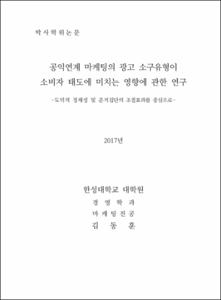공익연계 마케팅의 광고 소구유형이 소비자 태도에 미치는 영향에 관한 연구
= An Empirical Study of the Effects of Advertisement Appeal on Consumer's Attitude toward Cause Related Marketing: Focused on the Moderating Roles of Moral Identity and Reference Group
- Type
- Thesis
- Alternative Title
- 도덕적 정체성 및 준거집단의 조절효과를 중심으로
- Advisor
- 신민철
- Department
- 대학원 경영학과
- Issued Date
- 2017
- Publisher
- 한성대학교 대학원
- Files in This Item:
-
-
Download
 000002320225.pdf
기타 데이터 / 1.56 MB / Adobe PDF
000002320225.pdf
기타 데이터 / 1.56 MB / Adobe PDF
-
Items in Repository are protected by copyright, with all rights reserved, unless otherwise indicated.